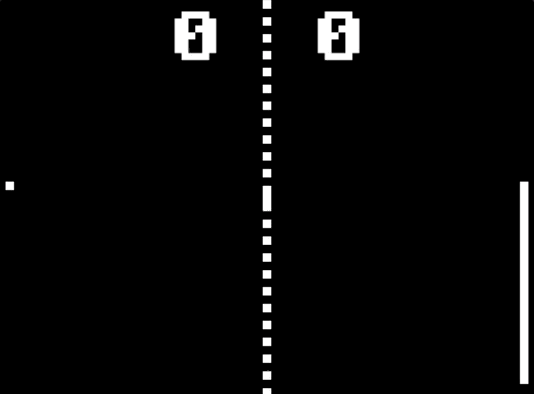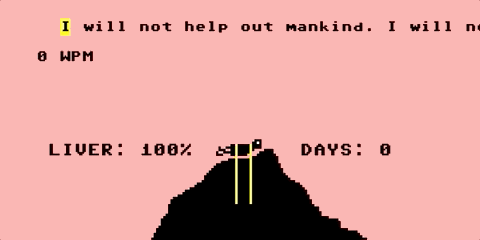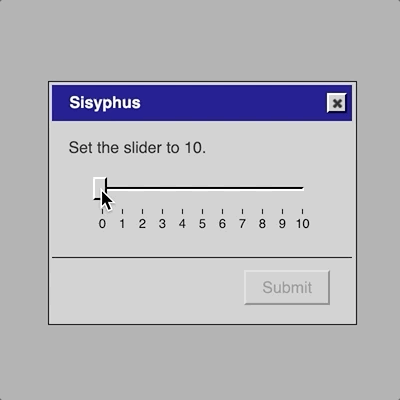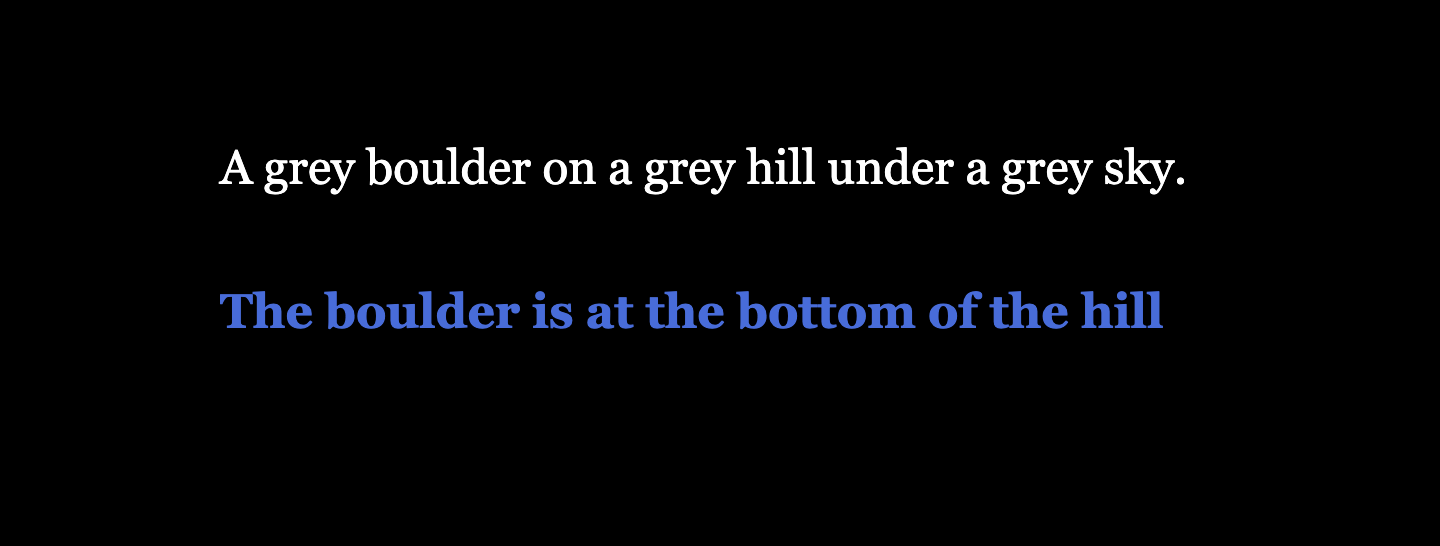A very short-form game design workshop.
In which, we take on three constraints in order to prototype a game in an hour or less!
Our starting point is a series of digital games I made between 2011 and 2019 about mythological Greek punishments. (More to come? Will I steal your ideas?)
- The original game (2011)
- The variations (2015–2019)
In order to actually prototype a game, we're going to constrain ourselves in three key ways.
- We'll choose a pre-existing game and/or prototyping materials (the form)
- We'll choose a pre-existing story (the myth)
- We'll choose a specific experience goal (the experience)
These things will inevitably influence each other. That's a good thing.
In my original videogame version of Sisyphus, for example, I had
- The form: simple minigames in the style of WarioWare
- The myth: Sisyphus (aka. guy pushing a rock up a hill forever)
- The experience: communicate eternal punishment dynamically, alluding to the repetitive (pointless?) labour of many videogames (so deep)
- Understand The Stuff Games Are Made Of
- Training as a Reflective Practitioner
- Understand Greek Mythology in a New Way
- Communicate your ideas in the language of play
- Constraints Are Good For Creative Process and You Know It
When you're making a game in a small amount of time, or are just inexperienced, a great way to start out is with a game or activity that already exists and just... change it.
We're not going to have time to make videogame variations, so we'll need to choose games/activities that we can prototype here in non-virtual reality.
What forms could we work from?
- Folk games (hopscotch, tag, hide and seek, ...)
- Sports (wrestling, hurdles, baseball, ...)
- Exercise (pushups, situps, running, ...)
- Literalism (pushing a heavy object, chaining someone to a rock, ...)
- Cards (go fish, poker, snap, ...)
- Dice (gambling, yahtzee, ...)
- Board games (snakes and ladders, monopoly, chess, ...)
- Language games (I spy, madlibs, 20 questions, ...)
- Social deduction games (werewolf/mafia, the resistance, ...)
- Social Media Challenges (the ice-bucket challenge, TikTok dances, face wax, ...)
- Rule-based Conceptual Art (Sol LeWitt, John Cage, fluxus, ...)
Let your mind start to see if it gravitates toward any particular games or activities. Familiarity and simplicity are usually a good idea. Try to notice how the materials as well as the rules might be a starting point for your design.
Remember: familiar and simple
(These are just fast ideas - not all tuned toward today.)
- "Go Fish" but you have to catch cards as they are thrown to you
- "Snakes and Ladders" but you play as the snakes and ladders
- "Hide and seek" but you all play with your eyes closed within 10 feet of each other
- A TikTok challenge where you film yourself pushing a boulder up a hill every day at 5am
- Holding a plank position while somebody slowly whispers a litany of all the terrible things you did into your ear
These are probably not good ideas! But you'll never know unless you try something!
It can be very helpful to have a specific narrative/story framing available as a kind of pre-determined element to your design process. We're going to use myths of punishment from Greek mythology because they are simple and evocative and this workshop is called Let's Prototype Ancient Greek Punishment.
- Sisyphus was sentenced to eternally push a boulder to the top of a slope, only to see it roll back down and to begin again
- Tantalus was hungry and thirsty but every time he reached for a fruit or stooped for water it moved away from him
- Prometheus was chained to a rock and doomed to have an eagle eat his liver every day
- The Danaids had to fill a bathtub one bucket at a time, but the bucket had holes so that they could never succeed
- Zeno of Elea came up with the idea the movement is impossible because to get somewhere you have to go halfway, then halfway from there, then halfway from there, ... and so on, ... forever?
Again, see if your mind gravitates toward one of these naturally and let it start making notional pairings between myth and form.
Find the specificities in your myth to help to unlock further potential: consider reading about it in a teeny bit more depth? Why were they punished? Did they ever escape? Do we know how they felt about it all?
Different myths may have different affordances for design...
- The myth of Sisyphus involves incredible physicality and strain, as well as Camus' assertion that Sisyphus might be... happy???
- The myth of Prometheus involves suffering inflicted on a restrained body, a very different dynamic to the endless tasks of the others
- Zeno of Elea was not (as far as we know) punished by the Gods, but should he have been? What would have been a good punishment?
- Tantalus could evoke a key emotion of ever frustrated longing
- The Danaids could tell a story of using the wrong tool for the job (don't bring a collinder to carry water)
What do we want a player of our game (or simply "experiencer of our experience") to think about and feel?
One option is to use our Form as an opportunity to create a deeper or distinctive connection to the myth itself. We could explore...
- The physicality of the protagonist
- The emotions of the protagonist
- "The struggle itself towards the heights is enough to fill a man's heart. One must imagine Sisyphus happy." ??? (Albert Camus in The Myth of Sisyphus)
- The thoughts of the protagonist
- Something High Concept like eternity
- The punisher's (Zeus, usually, right?) perspective (assigning punishments would be pretty fun?)
- The broader context and rationale for the punishment
We could also choose to prioritize an experience or idea that the myth is well-suited to explore (combined with our Form).
- A meditation on punishment in contemporary society? (As "corrective," retribution, reformation, biased, futile, cruel, ...)
- The idea of angering the gods/Fate/Facebook/ChatGPT...
- Forgiveness (it's okay to zig)
- Hopeless repetition as a meditation on contemporary life
- How the punishment could have been improved? What would Silicon Valley do? How would techbros disrupt the punishment market?
- The pleasures of repetitive action? The pleasures of observing repetitive action?
- Form small teams (2-3 perhaps?)
- Have a quick chat and introduce yourselves to each other
- Five minutes (timed!) of high-speed idea generation individually
- We're looking for an idea every 20 seconds (15 ideas total per person)
- Each idea should ideally address a specific set of Form, Myth, and Experience
- Discuss the ideas generated as a team and choose one to prototype
- A prototype only needs to be good enough to explore your idea
- Does not need "good graphics"
- 20 minutes (timed!) to prototype it with the materials to hand
- It doesn’t have to be good! It probably shouldn't be!
- If you finish early start another prototype!
- Even if you don't finish make sure you have something to show us
- Give your prototypes titles, it is fun!
- Show and tell time as a group (ideally we have time for this!)
- Tell us the title and explain the basic form-myth-experience (though keep the experience secret if you want to)
- Demo your prototype yourselves or with others depending on comfort level
- How easy did you find it to succinctly express what your prototype is meant to convey?
- And does it convey that? How does it?
- What does your myth/experience teach you about your materials (the form)?
- What do your materials teach you about your myth/experience?
- Is your prototype "the same as" a written account or animation of the myth? Why?
These are not the only questions to think about.





